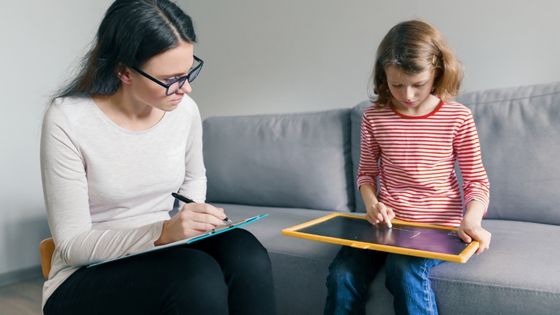ADHD is hereditary. As a result, a child who has ADHD is likely to have a parent who also has the disorder. Parents should be aware that this may present some difficulties. It is vitally crucial to diagnose and treat both the parent and the child. Attention deficit hyperactivity disorder (ADHD) diagnosis in parents can lead to a special set of difficulties, including a greater likelihood of parenting children who also have the disorder.

The diagnosis of ADHD in your child does not in any way implicate your actions as a parent in its development or origin. Many medical professionals think that inheritability may have a greater impact than environmental risk factors. Concerns about the kinds of difficulties their children might have as a result of having ADHD are common among parents who have it or believe they might. You can raise children with ADHD who are healthy and adjusted, so don’t worry. The entire family can benefit from finding out how to assist their children cope.
ADHD CHALLENGES FOR YOU AND YOUR CHILD
Parenting is challenging. Having an ADHD child means you have to raise someone who has higher expectations, who needs more engagement, and who needs more tolerance and understanding. If you have ADHD yourself, it may be more difficult to supply these.ADHD parents may experience difficulties with:
- Co-occurring mental health issues like depression or anxiety
- Managing feelings
- Putting discipline in place
- Taking care of routine housework
- Motivation Skills for Organization Stress
- Management of time
- Impulsivity
- Hyper sensory stimulation
HOW CAN PARENTS AND CHILDREN COPE WITH ADHD?
There are some self-help strategies you can use in your life to make parenting more bearable, in addition to ensuring that you and your child receive the proper care. You can plan out regular sessions with online counsellors for yourself to ensure that you are dealing with your situation in the best way possible.
Some coping strategies for dealing with your and your child’s ADHD can be-
1. Recognize the Problem Areas
Make a list of your advantages as well as some of your weaknesses. For instance, you might excel at assisting children with their homework and ensuring that they arrive at appointments on time, but struggle to maintain consistency in terms of discipline. Knowing which areas are more difficult can help you find solutions for them more quickly.
2. Find the Right Tools for You
There are various needs of every parent, child, and family. Your particular difficulties won’t be resolved by a one-size-fits-all strategy. Instead, pick the techniques and tactics that will help you meet your needs. Apps for food planning, appointment calendars, and reward charts are useful resources. To keep yourself on track, you can use your phone to create reminders for particular activities or to post notes in useful places.
3. Study behaviour modification
You can better parent an ADHD child by learning effective behaviour control techniques and skills. There are two key ideas that can be helpful:
- Encourage and reward positive conduct with prizes.
- Removing rewards and enforcing penalties for improper behaviour
You must set guidelines in order to implement a behaviour control strategy in your household. Establish expectations and decide whether actions are prohibited. Then make sure your children are aware of these guidelines.
4. Make a structure
Having a routine will help both you and your child, even though having ADHD might make things more difficult. Routines for important daily tasks, such as meals, homework, and bedtime, will assist your child stay focused and guarantee that daily obligations are fulfilled.
5. Eliminate Distractions
Distractions can be challenging for parents and kids alike. Regulating your screen time is a good idea, but so is streamlining and organising many aspects of your life. So that everyone knows where their books, homework, shoes, keys, and other daily necessities are, designate locations in your home where certain goods go.
6. Engage in Self-Care
Making sure your child gets enough sleep and exercises regularly each day will assist with hyperactivity, impulsivity, and lack of concentration. Self-care is also very important. Prioritize getting enough sleep, engaging in daily exercise, and consuming wholesome food.
7. Keep your strengths in mind
Although having ADHD is frequently portrayed negatively, keep in mind that it also gives you and your child numerous advantages. Your child is constantly eager to explore new things and take on life’s difficulties thanks to their high levels of energy and curiosity. Although having ADHD can make some situations more difficult for you and your child, it also means that you both have creative thinking, resiliency, and spontaneity, all of which can be assets in your success. And since you experience the same difficulties as your child, you can relate to them deeply.
UNDIAGNOSED ADHD IN PARENTS
Some people don’t realise that they have been living with attention deficit hyperactive disorder all their lives. They realise that their struggles match the symptoms their toddler is showing when they take them to get diagnosed. The symptoms of ADHD especially an undiagnosed one will make it very difficult for parents to keep up with their children’s symptoms. The problems arise even further when there is a non-ADHD partner or sibling in the family. Parenting is hard on its own but parenting a child with ADHD while managing your own symptoms can lead to anxiety, depression, stress, relationship issues and family problems.
At this point, parents can start online counselling and consult with the best psychologists on a platform which will ensure their privacy. Online counselling will also be beneficial as a person who is parenting a kid with ADHD while simultaneously dealing with their own symptoms would be often overwhelmed, and anxious and might also show signs of depression. One can connect with online counsellors and seek online counselling for their children with ADHD.

















